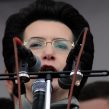
Tagliavini Commission Report Awakens an Extinct Protest Volcano in Georgia
Publication: Eurasia Daily Monitor Volume: 6 Issue: 197
By:

The name of the Swiss diplomat Heidi Tagliavini may soon be used as a flagship for a new protest movement in Georgia. The implacable Georgian opposition, who previously ran three-month long protest rallies which commenced in April, have reiterated their calls for pre-term elections in the country (www.civil.ge, October 2). Nino Burjanadze, the former parliamentary speaker and leader of the Democratic Movement-United Georgia party asserted that President Mikheil Saakashvili should be held responsible for his policies and has attempted to rally opposition parties to consider how “to set Georgia free of Saakashvili’s regime, so that the people can elect a truly national, accountable and state-minded leadership” (Interpress News, October 2).
The recent initiative to create a united front demanding the resignation of Saakashvili’s government was supported by the former defense minister Irakli Okruashvili, who is currently residing in France as a political refugee. Another statement by the movement “Protect Georgia,” headed by the former presidential candidate Levan Gachechiladze has attempted to draw a distinct line of division between Georgia and Saakashvili’s regime (Interpress News, October 3); while Gubaz Sanikidze, one of the leaders of the popular National Forum openly says “it is now time to get rid of Saakashvili by any means, any tool, whatever we come across on the way” (Asaval-Dasavali, October 5-11).
The idea of achieving regime change by radical means is not, however, supported by all the opposition forces. Among the ranks of those opposing such a stance, include the Alliance for Georgia leader Irakli Alasania, who intends to run for the post of Mayor of Tbilisi next fall. Alasania, however, supports the assumption that the E.U. Commission report is a grave conclusion for the Georgian president. “We believe that the politically irresponsible and indiscreet decision of the president to open fire on Tskhinvali has jeopardized Georgian statehood and its development as a free state,” Alliance for Georgia said in a statement on October 1. The statement continued by saying that the E.U.-commissioned report “has not changed the internal political agenda.” “The government has to be changed peacefully and constitutionally, through free and fair elections in the immediate future,” it added (www.civil.ge, October 2).
Saakashvili is attempting to leave unanswered any accusations made by the opposition. He said that the report is another victory for Georgian diplomacy, justifying his stance that “the war was started by Russia much earlier than August 7; while the Georgian side made the decision to engage in the military action only after Russian mercenaries and its regular army units started to invade Georgian territory” (Interpress News, October 3). In his address to the Georgian nation following the publication of the Tagliavini report, Saakashvili emphasized he would again do what he did on August 7, 2008, in other words give the order to open fire. “The countries that did not fire back have been erased from the map. I do not feel the slightest regret. I am proud of what happened. So, we do not need to be taught by anyone. What we did was what France, England or Germany would have done. We will never surrender. We will never give up our struggle,” Saakashvili said during his televised address on October 3 (Imedi TV, October 3).
In response to the opposition reiterating its demand for Saakashvili’s resignation and holding pre-term presidential elections, the Georgian government has intensified its media and public relations efforts, and has increasingly mentioned democratic and economic reforms, as well as dialogue with the opposition. Meanwhile, the president has also resumed his meetings with a part of the opposition within the extended Security Council format (Interpress News, September 11).
Moreover, Georgian government-controlled television channels have stepped up their coverage of the government’s anti-crisis activities, with Saakashvili always at the center of events. The opposition has claimed that national channels are purposefully discrediting opposition leaders, trying to present them as a Russian “fifth column.” Such accusations are not only directed against the opposition. Since the publication of Tagliavini’s report which accused the Georgian government of having started the war, the government-controlled television media have run multiple reports on the German professor Otto Luchterhandt, a member of the E.U. commission who the reports claim, has received a considerable fee from Gazprom for handing down his partial and biased conclusions (Express News, October 6).
Such allegations have become so frequent and acute that the German member of the E.U. commission was not the only person accused by the government-controlled media. According to television reports in early October, the German Foreign Minister Walter Steinmeier is another official collaborating with Gazprom (Express News, October 6). The latest accusation almost led to a diplomatic scandal. For the first time in the relationship of the two countries, the German ministry of foreign affairs categorically demanded that the Georgian news media “retract the false report” and “correct this false information” (www.civil.ge, October 7).
However, Germany and other E.U. states have continued their economic support for Georgia’s post-war recovery and democratic reforms. Georgia has received a total of $900 million in IMF credit since the war with Russia (Tavisupleba, October 8). The opposition welcomes such bountiful assistance from Europe and the United States, with one condition though: “It is time western taxpayers insisted that they will not be used to prop up authoritarianism and for Saakashvili to pay the price his responsibility demands and go,” according to Burjanadze (The Guardian, October 7).




